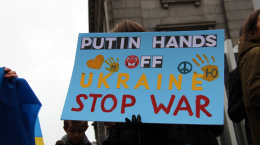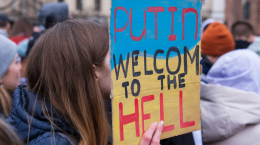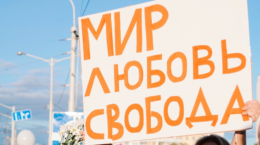The war in Ukraine is also affecting Belarus, although the illegitimate dictator keeps claiming our country is not taking part in it. Albeit not to the same extent as Russia, Belarus has felt the European sanctions. Which, naturally, did not help the economy, as the state-run mass media say. In this and the following stories, we will tell how the war in Ukraine unleashed by Putin and Lukashenko affected the Belarusian people and what we lost because of the two dictators.
Political sanctions against Belarus
On March 4, members of the Council of the Baltic Sea States, where Belarus was an observer, decided to expel Russia from the Council. Belarus, too, was suspended from the organization because of the state’s role in the attack on Ukraine. The Council consists of Denmark, Estonia, Finland, Germany, Iceland, Latvia, Lithuania, Norway, Poland, Sweden and the European Union.
On 6 March, Russia and Belarus got expelled from the International Union of Railways. It is a worldwide association for trade and economic cooperation between the main actors in the international railway sector. The union was founded in 1922 and is headquartered in Paris.
On March 18, Russia and Belarus got expelled from the European Conference of Telecommunications Administrations. The 34 member states of the conference supported Ukraine.
On April 1, Germany suspended cooperation with Russia and Belarus in the tax field. In particular, the exchange of information between tax authorities is suspended.
Twin cities of Belarusian cities across Europe terminate cooperation agreements. The Council of Kėdainiai District Municipality of Lithuania decided to terminate the cooperation contract with the Belarusian town of Volkovysk. Ukmerge Municipality prepared a similar draft resolution. It plans to unilaterally end the agreement with Oshmiany and Svisloch districts in Belarus. The municipality of Jonava district announced the termination of cooperation with Polotsk in Belarus.
The municipality of Jelgava, Latvia, unilaterally terminated the cooperation agreements concluded with the district executive committees of Grodno and Slavgorod. The Polish city of Bialystok also terminated the cooperation with Grodno.
Economic sanctions against Belarus
On February 25, the day after Russia invaded Ukraine, the United States imposed sanctions on Belarus. Apart from Belarusian officials, the sanctions affected Belinvestbank and Dabrabyt Bank, defence and security enterprises. On March 2, the USA announced new measures against Belarus. The Ministry of Trade promised to extend the strict export control policy imposed on Russia to Belarus as well. The restrictions will affect the export of high-tech products to Belarus.
On March 3, Canada imposed a 35% duty on exports from Belarus and Russia. “Canada will become the first country to strip Russia and Belarus of their most-favoured-nation status as a trading partner under Canadian law. It means that Russia and Belarus will no longer benefit from the preferential treatment and low tariffs that Canada offers to other countries, partners in the World Trade Organisation. Russia and Belarus will be subject to a 35% duty on their exports to Canada,” Canadian Deputy Prime Minister Chrystia Freeland said.
On March 6, South Korea imposed export controls on Belarus. “The South Korean government felt that Belarus was helping Russia’s invasion of Ukraine. The imposed measures will be the same as the sanctions of the South Korean government against Russia,” the country’s Foreign Ministry said in a statement.
On March 12, it became known that the USA had imposed restrictions on the export, re-export and sale of luxury goods to Belarus. These include alcohol, tobacco products, clothing, jewellery, cars and antiques. “We will not allow Putin and his henchmen to continue living in luxury, causing great suffering to Eastern Europe. Today’s action deprives them of another source of comfort and reminds them that Russia is becoming increasingly isolated. It should remind Putin and his Russian and Belarusian henchmen that the world strongly condemns the nightmare he has created. The United States, our allies and partners will continue to impose serious consequences on Russia and Belarus for their ongoing invasion of Ukraine,” US Secretary of Commerce Gina Raimondo said.
On March 14, the Bahamas joined sanctions against Belarus and Russia. The Central Bank of the Bahamas banned accountable financial institutions from conducting transactions with Russians and Belarusians subject to Western sanctions. The agencies, which are part of the Financial Services Regulatory Group, have banned participation in transactions of sub-sanctioned individuals and entities linked to Russia and Belarus. To clarify, the Bahamas is one of the largest offshore zones.
On March 15, the UK announced that it was ending its financial support for all exports to Russia and Belarus. There will be no more new guarantees, loans and insurances for exports to Russia and Belarus from the United Kingdom. In addition, exports of luxury goods have been stopped, and an additional tariff of 35% has been imposed on imports of steel, aluminium, silver, copper, fertiliser, works of art and drinks. Britain imposed more than 370 sanctions against Russia and Belarus.
On March 16, Switzerland tightened sanctions against Belarus. These sanctions include a ban on exports of all dual-use goods (civil or military) to Belarus, a ban on exports of goods that could contribute to the military-technical improvement of Belarus or the development of the defence and security sector. Existing bans on imports of wood and rubber products, iron, steel and cement into Belarus have been extended. In addition, Switzerland banned the provision of government funding or financial assistance for trade or investment in Belarus.
On March 18, Japan banned exports of more than 300 products and technologies to Russia and Belarus. The country also banned the export of oil refining equipment and related technologies.
On March 25, Australia imposed sanctions on 22 employees of Russian media and the illegitimate president of Belarus. The country’s Foreign Affairs Ministry said that Australia would continue imposing further sanctions to inflict significant damage on those in Russia and Belarus who are responsible or have leverage. On March 31, it became known that Australia imposed 35% duties on all goods imported into the country from Russia and Belarus, which will take effect from April 25, 2022.
On March 29, the Ukrainian authorities confiscated for state needs 7,000 tonnes of railcars with Belarusian potash fertilizers, which were bound for Asian countries and had probably entered the country before the outbreak of hostilities. Belarus started transporting fertilizers through Ukraine after Lithuania closed the possibility of transit of potash through its territory. However, this is now impossible as well. Belarus has no alternative logistic routes to deliver potash fertilizers. European Union has completely banned the transit of potash from Belarus, and it will be a problem to get potash to India and China, which are ready to buy the goods. Because of this, China and India did not sign long-term agreements, understanding the problems with logistics and waiting for a solution to the issue. Due to sanctions and the inability to transport potash, Lukashenko’s regime will lose at least USD 2.5 billion.
On April 1, the USA authorities announced about 120 more organizations from Russia and Belarus to be added to sanctions lists to cut them off from high technology. The list includes organizations related to the defence, aerospace and maritime sectors. The Minsk Wheeled Tractor Plant, the State Military Industrial Committee of the Republic, Agat-Electromechanical Plant, and Beltechexport are among them.
Financial sanctions against Belarus
On March 4, the Revolut service stopped transferring money to and from Russia and Belarus. “We are closely monitoring the situation in Russia and Belarus and, due to recent events, we have stopped bank transfers to/from Russia or Belarus,” Revolut explained. Its co-founder, billionaire Nick Storonsky, published an anti-war letter and said his company would donate up to $2 million to the Ukrainian Red Cross.
On March 9, the European Union disconnected three Belarusian banks from the SWIFT system: Belagroprombank, Dabrabyt Bank and Development Bank. It means that the bank customers can’t pay by cards, issued in them, outside Belarus and in foreign online services. It includes Spotify, Netflix, Wildberries, AIiExpress and Ozon. Belagroprombank bank cards have been no longer serviced in the EU since March 20. Customers of Belinvestbank and VTB also reported that they could not pay with their cards abroad and pay for purchases on foreign sites with these cards. BelVEB, RRB and Technobank have said about the failures. In addition, the European Union has imposed a ban on the provision of euro banknotes in Belarus. It means that the currency can be brought into Belarus in limited quantities.
Saturday, March 19, Visa and Mastercard payment systems will suspend the service of Sberbank cards in Belarus. It’s impossible to make payments abroad and in the online shop. The cards continue to work in Belarus, and their holders can withdraw money and make payments and transfers within Belarus.
Cryptocurrency will not save Belarusians either. Cryptocurrency exchanges CEX.IO and QMALL have blocked accounts and assets of users from Belarus. The Austrian company BITFLY, which owns the crypto miner ETERMINE (the world’s largest Ethereum cryptocurrency mining pool), no longer provides services to miners from Belarus.
The Western Union money transfer system has ceased operations in Russia and Belarus, as of March 24. The company said: “We join the international community in expressing sincere hope for a diplomatic and peaceful solution. In the meantime, our priorities remain the welfare and safety of our employees. We continue support for the people of Ukraine, including the growing number of refugees seeking safety.”
The terrible crimes against humanity at the hands of the Russian military continue in Ukraine. Like the entire civilised world, we are deeply affected by the tragedies in Bucha, Irpin, Gostomel, Chernihiv and Mariupol. We will never forgive Putin and Lukashenko, who unleashed this war.







